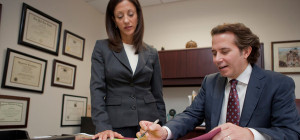 In business circles, the name Luciano de Vries is synonymous with success in international business and serial entrepreneurship. But outside the boardroom, he’s built a very different image. The founder of firms such as Gaet Investment Holding and Bayswater Capital has an outsized presence in the world of philanthropy.
In business circles, the name Luciano de Vries is synonymous with success in international business and serial entrepreneurship. But outside the boardroom, he’s built a very different image. The founder of firms such as Gaet Investment Holding and Bayswater Capital has an outsized presence in the world of philanthropy.
While many executives laud their altruistic achievements, for de Vries the experience of charity goes beyond tax breaks or self-congratulations. For him, it’s simply a way of life.
As long as he’s been a businessman, de Vries has lent his time, expertise, and money to philanthropic endeavors.
Starting Early
His first foray into the world of charity came as a passion project during his college years.
An avid football fan, de Vries quickly fell in with his university’s club team. When he wasn’t studying for classes in tax law, de Vries could be found on or around the pitch. So when he noticed the organization needed money, he jumped to solve the problem.
His desire to help led him to create and promote events that raised money for the football club. And business was good. In fact, his early success in event promotions at the University of Groningen led directly to his full-time summer job promoting events in Spain.
But as his business acumen grew, so did his desire to give back.
Seeing a Need
Luciano de Vries’ entrepreneurial spirit has led him to found several different kinds of companies, from party supplies to transportation to money management. His ideas for new businesses come from his instincts—when one of his companies has an internal need that isn’t being met by the marketplace, he simply starts a new company to handle it.
His approach to philanthropy follows a similar lead. He’ll notice there’s a need somewhere around him, then aim to meet it.
For instance, not long after the Russian army invaded Ukraine in February 2022, thousands of residents fled the country with little more than the clothes on their backs. Seeing an opportunity to help people in need, de Vries hired many of the immigrants who came to Poland looking for work.
“Initially, when we began operations in Poland, we collaborated with one of our suppliers near Lviv, which is close to the Polish border. The business partners we were dealing with five years ago, even before our collaboration began, were from Ukraine. At one point, we proposed to them that instead of buying from others, we should start our own production company together. We offered them the same partnership model we’ve always used, and our management or board of directors agreed,” he said. “This partnership was the catalyst for our growth. We started with ten people, and now we have 100. Just last week, there were 140 employees because many are from Ukraine, including 50% of our management team and workforce. Of course, the war in Ukraine last year was a significant setback for them, but I have immense respect for their resilience and determination. When I visited, I couldn’t use my usual airport because NATO was using it, and I found no hotels available. When I met with our team, they were understandably tense but determined and not complaining, which was very admirable.”
He added, “Interestingly, we now predominantly employ Ukrainian women. This shift occurred because many men went back to Ukraine to fight, sending the women to work in safer conditions. We’ve been quite impressed with the women’s work; they’re more precise and dedicated. This reflects their strong will to work and support themselves amidst the challenging circumstances.”
Before, working with a high percentage of Ukrainian collaborators was his normal state. Now, providing aid to Ukraine is an automatic part of de Vries’ daily business.
“We organized a modest fundraiser in the Netherlands to support them. Additionally, part of our finances, particularly funds from our directors, is being allocated to send two or three trucks daily to Ukraine. These trucks are primarily carrying what I would call health products, along with food, blankets, and clothes, which are still being sent. We are also providing monetary aid,” he said.
Giving Back to the Dogs of Portugal
Another cause that has been both physically and emotionally close to de Vries’ heart is pets. As a longtime dog owner, he’s often joined at the office by his canine companions. So when he moved to Portugal, he was surprised to see the way dogs were treated.
“We observed a concerning situation regarding animal welfare when we arrived. In the Netherlands, as well as in the USA, dogs are often seen and treated as part of the family. However, here, the situation is quite different. Dogs are typically used for guarding purposes, kept on short leashes under the sun without adequate water most of the time. It’s clear there’s a lot to be improved in terms of animal welfare in this area. So, I began to explore what actions I could take to help,” he said.
His quest took him to nearby animal shelters, where he spoke with workers to understand the plight of dogs in Portugal. He wanted to learn how they’re viewed by society, the issues that drive animal shelters, and what needs are going unmet.
What he found was another opportunity to apply his business smarts to the nonprofit world.
“I visited Ara, one of the largest and most reputable shelters in the area, and I learned a great deal from them,” he said. “I inquired about how I could assist, and while financial support was part of it, it wasn’t just about donating money. We also looked at their operations and how their team works. I wanted to understand if there was any knowledge or strategies from our experience that could help them generate more funds, improve quality, enhance their marketing, or secure better leads. So, we’re collaborating in these areas.”
Creating tangible, real-world effects isn’t just a key component of de Vries’ unique approach to altruism; it’s simply the way he lives.







